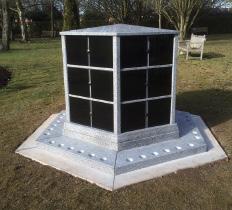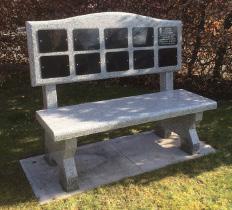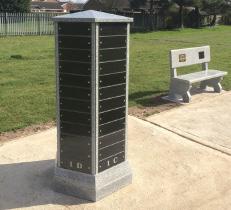
11 minute read
Keep updated
Deceased Management Advisory Group (DMAG)
With the coronavirus pandemic dominating our lives, any updates have focused on this, with changes taking place, what feels like, daily.
Advertisement
The bereavement sector is represented by several organisations, covering both funeral directors and those who manage, provide and work in cemeteries and crematoria. The major organisations have combined to work together to develop a consensus approach to the many challenging issues which now face the sector and have formed The Deceased Management Advisory Group (DMAG). These include representatives from the following organisations
The Association of Private Crematoria and Cemeteries (APCC) Federation of Burial and Cremation Authorities (FBCA) Funeral Furnishing Manufacturers’ Association (FFMA) Institute of Cemetery and Crematorium Management (ICCM) National Association of Funeral Directors (NAFD) National Society of Allied & Independent Funeral Directors (SAIF) The Cremation Society
DMAG have set up a dedicated website www.dmag2020.org detailing guidance and updates on legislation.
Guidance
The Health Protection (Coronavirus, Restrictions) (England) (Amendment) Regulations 2020 – Closure of Crematoria and Burial Grounds
On 21st April 2020 the Secretary of State, Department of Health and Social Care, signed the Health Protection (Coronavirus, Restrictions) (England) (Amendment) Regulations 2020. This clarifies the position in England relating to the closure of crematoria and burial grounds. The new regulations remove wording relating to burial grounds in paragraph 5(8), and adds a sub-paragraph, (8A), stating that paragraph (8) does not apply to any grounds surrounding a crematorium. Paragraph (8) and (8A) now read:
(8) Subject to paragraph (8A), a person who is responsible for a crematorium must ensure that, during the emergency period, the crematorium is closed to members of the public, except for funerals or burials. (8A) Paragraph (8) does not apply to the grounds surrounding a crematorium, including any burial ground or garden of remembrance.
This means that burial grounds and gardens of remembrance may remain open. However, the burial or cremation authority or company can make the decision to close them or limit access for health and safety or operational reasons.
The Amendment Regulations also address the reasons that people may leave the place they are living during the emergency period:
Restrictions on movement
6.—(1) During the emergency period, no person may leave the place where they are living without reasonable excuse. (2) For the purposes of paragraph (1), a reasonable excuse includes the need—
(g) to attend a funeral of—
(i) a member of the person’s household, (ii) a close family member, or (iii) if no-one within sub-paragraphs (i) or (ii) are attending, a friend;
(ga) to visit a burial ground or garden of remembrance, to pay respects to a member of the person’s household, a family member or friend
19th April 2020 - guidance for managing a funeral during the coronavirus pandemic – Government advice issued
On Saturday 18 April 2020 Robert Jenrick, Local Government Secretary, announced at the Government’s daily press briefing that he is ‘asking councils to keep open or indeed to reopen cemeteries and graveyards’, and that the Government will publish further guidance on funerals.
The further guidance was published on 19th April 2020 and the link can be found on our website at www.iccm-uk.com. Despite not mentioning the closure or otherwise of crematoria and cemeteries, there are some key changes that will need to be taken into consideration.
Key highlights of the revised guidance include: • the bereaved are treated with sensitivity, dignity and respect • mourners and workers involved in the management of funerals are protected from infection
Venue managers should: • restrict the number of mourners who attend so that a safe distance of at least 2 metres (6 ft) can be maintained between individuals • the size and circumstance of the venue will determine the maximum number that can be accommodated whilst also facilitating social distancing, but numbers should be minimised as far as possible. Venue managers may set caps on numbers in order to ensure this • only the following should attend, alongside the Funeral Director, Chapel Attendant, and funeral staff: • members of the person’s household • close family members • or if the above are unable to attend, close friends • attendance of a celebrant of choice, should the bereaved request this • mourners who attend should be signposted to the advice on social distancing and that they should not attend the funeral if they are unwell with symptoms of coronavirus (COVID-19) • venue managers should ensure that handwashing facilities with soap and hot water and hand sanitiser are available and clearly signposted • venue managers should ensure that processes are in place to allow a suitable time to clean and disinfect the area in which the service has taken place both before and after each service, paying attention to frequently touched objects and surfaces, using regular cleaning products • venue managers should consider how to manage the flow of groups in and out of their venues to minimise overlap between different groups and allow for adequate cleaning • venue managers should maximise ventilation rates of the premises by opening windows and doors where possible • Local Authorities should ensure funeral arrangements and numbers of attenders are consistent with this guidance.
The Guidance also allows for mourners to attend even if they are self-isolating due to a possible case of coronavirus (COVID-19) in their household, or if they are extremely clinically vulnerable. This new allowance is subject to those mourners following the precautions outlined in the Guidance.
Anyone who is showing symptoms of coronavirus (COVID-19) (a new continuous cough or a high temperature) should not attend the funeral due to the risk that they pose to others; remote participation should be considered, for example live streaming.
The Guidance also states:
To ensure that organisations managing funerals are able to cope with the increased number of deaths, it is important that funerals are not delayed. We understand how difficult this will be for the families and friends of lost loved ones, however the current guidance will be in place for the foreseeable future for the safety of the public.
Electronic Forms
The Cremation Regulations 2008, as amended, provides for crematoria to accept forms electronically. The Ministry of Justice has issued guidance to cremation authorities and crematorium managers that details what is required for the electronic submission of forms. These are forms 1-13. Any electronic communications must be via a secure system and not a social media app, for example. The Guidance requires that forms come from a reliable source. Should somebody completing the forms give misleading information, the onus will be on them and not the cremation authority. Before authorising a cremation, a Medical Referee needs to check and be satisfied that the forms have come from a reliable source; if so, the forms would be deemed to have been signed and the Medical Referee can accept them.
Registrar’s Certificate for Burial or Cremation (Green Form)
The Coronavirus Act 2020 (Commencement No. 1) Regulations 2020 enables Registrars to send the disposal certificate electronically to a cemetery or crematorium. The Deputy Registrar General issued initial Guidance on this subject. The guidance states that
It is not envisaged that scanned documents should be received via a third party. Disposal forms can be completed manually and scanned or photographed for onward sending. Registrars should engage to find an email address for the relevant authority (local burial and crematorium authority); which could be a local authority shared mailbox (as long as the relevant person at the crematorium or cemetery can access it) as well as an address for returning counterfoils.
After the emergency period, arrangements should be made to have all original forms sent to the register office to be processed in the normal manner. (Members are advised to check with their local register office if this is required for counterfoils).
The relevant authority is either the burial authority or the crematorium where the funeral is to take place however depending on the circumstances the Green may also be copied to the relevant funeral director (as long as arrangements have been made for secure receipt company mailbox etc).
Changes to the Cremation Forms
On 26 March 2020 the Home Secretary, Priti Patel, signed the Coronavirus Act 2020 (Commencement No. 1) Regulations 2020. These Regulations relate to the Coronavirus Act 2020, and effectively ‘switch on’ the provisions that could only be enacted by separate regulation.
In England and Wales, a confirmatory medical certificate (Cremation Form 5) is no longer required for cremations. A Medical Certificate (Cremation Form 4) and an Authorisation of cremation of deceased person by medical referee (Cremation Form 10) are still required, together with an Application for Cremation (Cremation Form 1), and a Registrar’s Certficate for Disposal or a Coroner’s Certificate (Form 6) .
The requirement for form Cremation 4 to be completed by the attending medical practitioner is suspended. Any medical practitioner can now complete form Cremation 4, even if they did not attend the deceased during their last illness or after death, if the following conditions are fulfilled:
i. The medical practitioner who did attend the deceased is unable to sign the form Cremation 4 or it is impractical for them to do so and,
ii. A medical practitioner has seen the deceased (including audiovisual/video consultation) within 28 days before death, or has viewed the body in person after death.
Examination of the body is not required for completion of form Cremation 4 if the deceased was seen by a medical practitioner (including audiovisual/video consultation) in the 28 days before death.
Scotland
On 21 April 2020 the Scottish Government published Coronavirus (COVID-19): local death management – statutory guidance for local authorities. The Statutory guidance relates to Schedule 28 of the Coronavirus Act (2020) which introduced new powers for local authorities and government to support the resilience of local death management systems, and step in if they become overwhelmed.
They also published The Health Protection (Coronavirus) (Restrictions) (Scotland) Amendment (No. 2) Regulations 2020. This clarifies the position in Scotland relating to the closure of crematoria and burial grounds. The new regulations remove wording relating to burial grounds and burials in paragraph 9, and adds a sub-paragraph, (9A), stating that paragraph 9 does not apply to any grounds surrounding a crematorium. Paragraph 9 and 9A now read:
(9) A person who is responsible for a crematorium must ensure that, during the emergency period, the crematorium is closed to members of the public, except for funerals where reasonable measures are taken to ensure that a distance of two metres is maintained between every person on the premises of the crematorium during the funeral (other than between two members of the same household, or a carer and the person assisted by the carer).
(9A) Paragraph (9) does not apply to the grounds surrounding a crematorium, including any burial ground or garden of remembrance.







Burial authorities
The Regulations do not require burial grounds to close to the public.
Public access to burial grounds, where that is normally permitted by the burial authority, can continue. Access remains at the discretion of the burial authority.
Application for cremation – emergency legislative provision
The UK Coronavirus Act 2020 allows Scottish Ministers to suspend the effect of certain provisions in relation to the making of an application for cremation, and the handling of ashes following a cremation. The provisions that may be suspended are in the Burial and Cremation (Scotland) Act 2016 (“the 2016 Act”) and the Cremation (Scotland) Regulations 2019.
On 8 April 2020 the Scottish Ministers published a determination, in exercise of the power contained in paragraph 8(1) of schedule 14 of the UK Coronavirus Act 2020.7
The determination provides that section 49 of the 2016 Act is not to have effect in relation to the signing of a declaration in an application for cremation made under the 2016 Act. This means that the offence in section 49 of the 2016 Act, in relation to the provision of incorrect or misleading information in an application for a cremation, is now suspended.
This emergency provision came into force on Wednesday 8 April 2020. This change will remain in place until revoked by a subsequent determination of the Scottish Ministers under schedule 14 of the 2020 Act.
It is not permitted for a funeral director to sign a cremation application form on behalf of an applicant.
If an applicant cannot sign a cremation application due to adherence to NHS advice on staying at home, social distancing or shielding, a supplementary form has been produced for use by funeral directors and cremation authorities to ensure arrangements can continue and an audit trail of this action captured. This is set out below.
Application for cremation – supplementary form
Due to the current pandemic, where a funeral director is unable to receive a signature from a person listed in sections 65 or 66 of the 2016 Act to complete an application for cremation, a supplementary form can be supplied to ensure arrangements can proceed.
This can be accessed via the Scottish Government website.
Application for burial
Application forms for burial are the responsibility for each burial authority.
Confirmation of lair ownership is required before progressing an application for burial. If not done so already, processes should be examined to take into account the impact that NHS Inform advice on social distancing may have for applicants (e.g. documents provided electronically from applicant and/or funeral director).
Required signatures may also be difficult to obtain during the current pandemic due to adherence to NHS Inform advice. Burial authorities should consider, if they have not done so already, creation of an appropriate supplementary form or other method that satisfies their requirements for burial for use by local funeral directors/applicants
Further information is available on the Scottish Government website.
Competition and Markets Authority (CMA)
Extension of market investigation
16 March: The CMA has decided to extend the statutory deadline for the funerals market investigation by 6 months.
The deadline for responding to the working papers published on 20 February is suspended until further notice.







